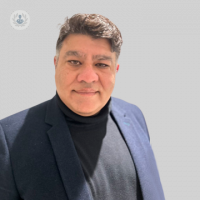Frequently asked questions about kidney stones
Written by:Kidney stones are small, hard deposits that form in the kidneys, and can be a painful and uncomfortable condition. We speak to renowned consultant urologist Mr Junaid Masood, who explains their causes, symptoms, diagnosis, treatment and prevention.

What are kidney stones?
Kidney stones, or renal calculi, are solid formations of minerals and salts that accumulate in the kidneys. These stones can vary in size, ranging from a grain of sand to larger stones that resemble crystals. When these stones move through the urinary tract, they can cause severe pain and discomfort.
What causes kidney stones?
Various factors contribute to the formation of kidney stones. The most common culprits include:
- Dehydration: Insufficient water intake can lead to concentrated urine, making it easier for minerals and salts to crystallise and form stones.
- Dietary habits: high consumption of certain foods, such as oxalate-rich foods (spinach, beets, nuts) and excessive intake of salt or animal proteins, can increase the risk of kidney stone formation.
- Family history: genetic factors may play a role in predisposing individuals to kidney stone formation.
- Medical conditions: certain medical conditions, such as obesity, digestive diseases, and metabolic disorders, can contribute to the development of kidney stones.
What are the symptoms of kidney stones?
The symptoms of kidney stones can vary, but common symptoms include:
- Severe pain: the most notable symptom is intense pain, often described as waves of pain radiating from the back to the lower abdomen.
- Urinary changes: discoloured or foul-smelling urine, blood in the urine, and increased frequency of urination may indicate the presence of kidney stones.
- Nausea and vomiting: some individuals may experience nausea and vomiting due to the severe pain.
How are kidney stones diagnosed?
To diagnose kidney stones, healthcare professionals may employ various methods, including:
- Imaging tests: X-rays, CT scans, and ultrasounds can provide detailed images of the kidneys and urinary tract, helping to identify the size and location of the stones.
- Urine analysis: examination of urine can reveal the presence of minerals or substances that contribute to stone formation.
What is the recovery time after passing a kidney stone?
The recovery time after passing a kidney stone varies depending on factors such as stone size and individual health. Small stones may pass on their own, causing minimal discomfort. However, larger stones may require medical intervention, and recovery time may extend to several weeks.
What specialist treatment options are available for kidney stones?
The treatment of kidney stones will depend on their size and location. Small stones can often pass through without requiring intervention. Larger stones will usually require treatment which may be in the form of:
- Extracorporeal Shockwave Lithotripsy (ESWL) – this is a non-surgical procedure which uses high energy sound waves to fragment the stone into smaller pieces which will then usually pass out in the urine.
- Ureteroscopy and laser stone fragmentation – a fine camera is passed through the urinary tract to the stone, which is then broken-down using Laser.
- Percutaneous Nephrolithotomy (PCNL surgery) - this is minimal access surgery to treat larger or more complex stones.
Can kidney stones cause long-term damage to the kidneys?
While most kidney stones do not cause permanent damage if promptly addressed, recurrent or untreated cases can lead to complications. Persistent blockages and urinary tract infections associated with kidney stones may result in long-term kidney damage.
Can kidney stones be prevented?
Preventing kidney stones involves adopting a proactive approach:
- Hydration: adequate water intake is crucial in preventing the concentration of minerals in the urine.
- Dietary modifications: limiting the intake of oxalate-rich foods, reducing salt and animal protein consumption, and maintaining a balanced diet can help prevent stone formation.
- Regular exercise: physical activity promotes overall health, reducing the risk of obesity and metabolic disorders associated with kidney stones.
- Medical guidance: individuals with a family history or predisposition to kidney stones should consult healthcare professionals for personalised preventive measures.
If you would like to book a consultation with Mr Masood, simply visit his Top Doctors profile today


